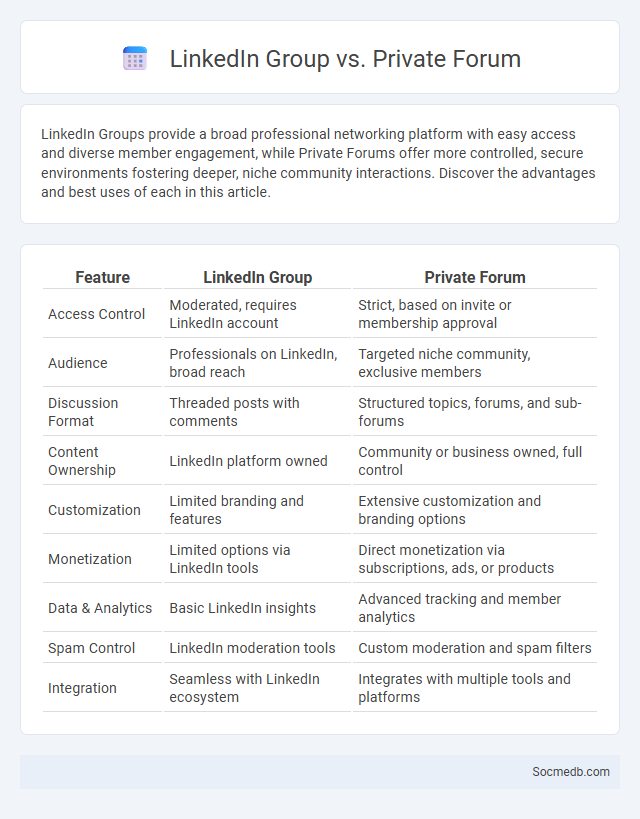
Photo illustration: LinkedIn Group vs Private Forum
LinkedIn Groups provide a broad professional networking platform with easy access and diverse member engagement, while Private Forums offer more controlled, secure environments fostering deeper, niche community interactions. Discover the advantages and best uses of each in this article.
Table of Comparison
| Feature | LinkedIn Group | Private Forum |
|---|---|---|
| Access Control | Moderated, requires LinkedIn account | Strict, based on invite or membership approval |
| Audience | Professionals on LinkedIn, broad reach | Targeted niche community, exclusive members |
| Discussion Format | Threaded posts with comments | Structured topics, forums, and sub-forums |
| Content Ownership | LinkedIn platform owned | Community or business owned, full control |
| Customization | Limited branding and features | Extensive customization and branding options |
| Monetization | Limited options via LinkedIn tools | Direct monetization via subscriptions, ads, or products |
| Data & Analytics | Basic LinkedIn insights | Advanced tracking and member analytics |
| Spam Control | LinkedIn moderation tools | Custom moderation and spam filters |
| Integration | Seamless with LinkedIn ecosystem | Integrates with multiple tools and platforms |
Introduction to Online Professional Communities
Online professional communities offer a dynamic platform for networking, knowledge sharing, and career advancement within specific industries. These digital spaces connect professionals worldwide, enabling collaboration, mentorship, and access to exclusive resources tailored to your field. Engaging actively in these communities enhances your visibility and fosters valuable relationships that can propel your career forward.
LinkedIn Groups: Features and Use Cases
LinkedIn Groups offer a powerful platform for professionals to network, share expertise, and engage in industry-specific discussions, enhancing your visibility within targeted communities. Members can post content, ask questions, and collaborate on projects, making it an ideal tool for knowledge exchange and business development. Leveraging LinkedIn Groups strategically helps you establish authority, generate leads, and stay updated with trends relevant to your field.
Private Forums: Benefits and Limitations
Private forums offer a secure environment for focused discussions, fostering trust and in-depth interactions among members. These platforms enhance community building by allowing controlled access, which reduces spam and protects user privacy. However, limitations include restricted reach and slower content growth compared to public social media, potentially limiting diverse perspectives and engagement.
Niche Communities: Focused Engagement
Niche communities on social media platforms foster highly focused engagement by connecting users with shared interests, values, or goals. These specialized groups increase content relevance and interaction quality, driving deeper conversations and stronger relationships. Platforms like Reddit, Discord, and Facebook Groups exemplify how targeted communities boost user retention and brand loyalty through personalized experiences.
Member Experience: Interaction and Networking
Social media platforms enhance member experience by facilitating seamless interaction and meaningful networking opportunities. Engaging features like real-time messaging, community groups, and personalized content help you connect with like-minded individuals, fostering a sense of belonging and collaboration. These dynamic interactions boost user satisfaction and support the growth of vibrant online communities.
Moderation and Content Quality
Effective social media moderation ensures content quality by filtering harmful, misleading, or inappropriate posts, enhancing user experience and platform safety. Advanced AI algorithms combined with human oversight enable timely detection and removal of violations while preserving free expression. Maintaining high-quality content fosters community trust and promotes constructive engagement across diverse online audiences.
Privacy and Data Security Considerations
Social media platforms collect vast amounts of personal data, making privacy and data security critical concerns for users and organizations alike. Implementing end-to-end encryption, strict access controls, and transparent data policies helps safeguard sensitive information against unauthorized access and cyber threats. Users should also employ strong passwords, enable two-factor authentication, and regularly review privacy settings to maintain control over their digital footprint.
Growth Potential and Scalability
Social media platforms demonstrate immense growth potential through continuous user base expansion and diversified content formats, driving increased engagement and advertising revenue. Scalability is achieved by leveraging cloud infrastructure and AI-driven algorithms that efficiently manage vast amounts of data and personalize user experiences in real-time. This adaptability enables platforms like Facebook, Instagram, and TikTok to rapidly evolve and capture emerging markets globally.
Monetization and Value Creation
Social media platforms generate significant revenue through targeted advertising, influencer partnerships, and subscription models, driving monetization by leveraging vast user data and engagement metrics. Content creators and brands create value by building loyal communities, fostering authentic interactions, and utilizing analytics to optimize reach and conversion rates. Advanced algorithms personalize user experiences, increasing time spent on platforms and enhancing monetization opportunities for all stakeholders.
Choosing the Right Platform for Your Goals
Selecting the ideal social media platform depends on your target audience, business objectives, and type of content you plan to share. For B2B companies, LinkedIn offers powerful networking and lead generation capabilities, while Instagram and TikTok excel in engaging younger demographics through visual and video content. Prioritizing platforms that align with your marketing goals ensures higher engagement rates, better conversion potential, and more efficient resource allocation.
 socmedb.com
socmedb.com